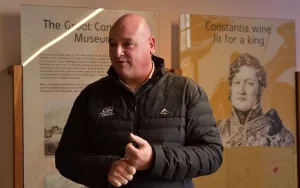The Presidential Budget Vote of 2024 outlines President Cyril Ramaphosa’s vision for South Africa’s future, with a focus on inclusive growth, job creation, poverty reduction, and ethical, capable, and developmentoriented governance. The government’s strategy involves collaboration and partnership across the public and private sectors, with civic engagement and scientific innovation playing a key role. The Presidency is committed to tackling youth unemployment, genderbased violence and femicide, and implementing initiatives to improve economic and social wellbeing for all South Africans.
Leadership is about creating a trustworthy, creative, and progressive environment. Effective leaders motivate their team members to become leaders themselves, resist micromanagement, and allow their team the necessary autonomy to excel. Gasant Abarder’s leadership journey emphasizes the importance of trust, empathy, and transparent communication in creating a positive work environment that promotes productivity and innovation. His experiences provide crucial insights into what it takes to motivate a team, stimulate creativity, and lead growth.
The South African government aims to provide safe and affordable housing for all citizens. This includes disaster readiness, durable infrastructure, community involvement, sustainable growth, social equality, and conservational guardianship. The government has implemented policies to promote inexpensive housing alternatives and collaborations between the public and private sectors. They have also undertaken rural housing solutions and legislative measures to oversee the home building industry and safeguard housing consumers. Deputy Minister Hon. Tandi Mahambehlala emphasized the government’s dedication to this vision in her recent address to Parliament.
Spier Wine Farm, known for crafting excellent wines from fertile soil and skilled winemakers, recently won six Gold Medals and a Grand Gold Medal at the 31st Concours Mondial de Bruxelles. The awards recognize the farm’s commitment to cultivating quality in diversity and across different pricing brackets. Their exceptional 21 Gables range and Seaward selection embody the essence of Stellenbosch and South Africa’s coastal regions, carving a niche for themselves and the country in the global wine industry.
Cape Town is investing R77 million in a program to tackle youth unemployment and skills shortages in informal settlements. The program provides temporary employment contracts as janitors and diverse training programs, aimed at reducing unemployment and boosting confidence and independence among participants. With an emphasis on personal development and valuable work experience, the program is a powerful investment in the future of Cape Town’s youth.
The South African property market and economy have been dealt a blow with the Reserve Bank’s decision to keep the repo rate at 8.25%, causing frustration and disappointment among industry figures. The high interest rate, combined with rising living costs and a stagnant economy, is putting pressure on everyday South Africans, particularly middleclass homeowners. Despite this, there is hope for the future, with anticipated interest rate cuts and the Government of National Unity’s potential to drive economic growth. Homebuyers may find themselves on the brink of a golden opportunity amid the current challenges.
The South African government is committed to providing housing for its citizens and has allocated a substantial part of its budget to upgrading informal settlements and providing access to basic amenities. Despite fiscal issues and budget reductions, the government is focusing on social and affordable housing and launched initiatives to empower vulnerable groups and small businesses. The government is also aiming to create spatially integrated human settlements, improve disaster and emergency housing, and expedite the issuance of title deeds to deserving beneficiaries.
South African Revenue Service (SARS) is taking firm action to combat tax evasion by international online retailers like Shein and Temu, who have been exploiting tax gaps to provide competitive pricing. SARS is revamping its tax rules and administrative procedures to extract taxes more efficiently from these platforms, and packages will be taxed at 45% plus VAT, the same percentage as local clothing retailers. SARS aims to forge a balanced marketplace for all retailers by plugging these tax gaps and conveying a potent message to online retailers that the era of tax loophole exploitation is coming to an end.
The Unexpected Storm Swirling Around South Africa’s National Student Financial Aid Scheme
South Africa’s National Student Financial Aid Scheme (NSFAS) is currently embroiled in a legal battle over a contentious contract with eZaga, Coinvest Africa, Tenet Technology, and Norraco Corporation, which was aimed at disbursing payments to university and TVET college students. The contract’s termination was met with an urgent court application from eZaga, which secured a favorable ruling on July 15th due to irregularities in the tender award process. The situation remains complex, impacting the students who depend on the aid.
The 2024/25 Budget Vote of National Treasury: A Blueprint for Financial Stability and Economic Unity
The 2024/25 Budget Vote of National Treasury is a blueprint for financial stability and economic unity in South Africa. It aims to reduce the fiscal deficit and debtservice costs through stringent spending controls and revenue initiatives, while promoting fiscal sustainability, economic integration through infrastructure development, and sustainable development. The plan requires the united efforts and commitment of all stakeholders, including the government, private sector, and citizens, to achieve its goals.
The Minister of Tourism in South Africa, Patricia de Lille, aims to make tourism a crucial driver of economic progression and job provision in the country. Her vision is outlined in the National Development Plan and Tourism Sector Master Plan, which highlight the potential for skill enrichment, job formation, income generation, and sustainable community growth. Initiatives include a maintenance program for national parks, a national Air Access Strategy, and visa waivers. The tourism sector in South Africa is constantly evolving, and de Lille’s commitment to her role as Minister of Tourism is commendable.
Cape Town’s tourism sector has achieved a significant milestone with the introduction of a new partnership that highlights the city’s unique features and experiences. The partnership amplifies the perspectives and knowledge of local tourism providers to create captivating marketing content that resonates with people around the world. The campaign has already reached over 2.3 million people and garnered more than 2.7 million impressions, boosting inbound travel and generating excitement for the future of Cape Town’s tourism industry.
BIC has teamed up with Paralympian Mpumelelo Mhlongo to help disadvantaged students in South Africa ahead of the Paris 2024 Paralympics. BIC’s ‘Together We Can Write the Future’ initiative aims to tackle high school dropout rates by giving academic materials to students, with the company having already donated 15 million writing instruments since the ‘Buy a Pen Donate a Pen’ scheme began in 2012. The partnership with Mhlongo is a significant step towards promoting positive change in South Africa.
The Defence Budget Vote 2024 is a comprehensive plan that highlights the multifaceted role of the South African National Defence Force in ensuring national security and contributing to societal development. It emphasizes a ‘soldierfirst’ approach and allocates funds for the welfare of soldiers, military veterans, and youth unemployment. The budget also addresses technological advancements and provisions for various essential organizations that play vital roles in the functioning of the Defence Force. It showcases the commitment of the Defence Force to serving the nation, not just on the battlefield, but also in broader societal development.
The DPME plays a vital role in ensuring governance coherence in South Africa by institutionalizing planning, creating an integrated monitoring system, critiquing important government programs, and generating research outputs to guide decisionmaking. What is the Essential Role of DPME?
Former EFF chair, Dali Mpofu, has confirmed that the party received funding from the bankrupt VBS Bank. The revelations emerged from an affidavit written by the exchair of VBS Mutual Bank and Vele Investments, Tshifhiwa Matodzi, who suggested that VBS contribute R5 million and an additional R1 million monthly to the EFF. Mpofu admitted that the party had received funds from the failed bank, but claimed that the information was already in the public domain. The impact of the disclosure on both the EFF and VBS’s reputation remains uncertain.
















